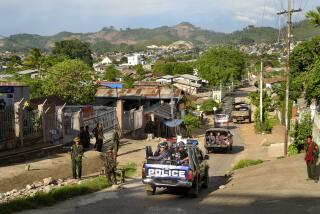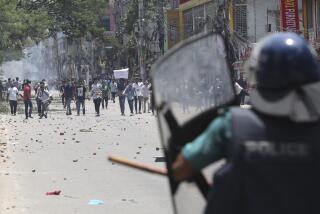Myanmar Threatens Activist Buddhists : Asia: Monasteries are cordoned off as monks refuse to minister to soldiers in protest over government crackdowns on demonstrators.
- Share via
YANGON, Myanmar — Soldiers cordoned off Buddhist monasteries in Mandalay, Myanmar’s second largest city, Saturday after the military government threatened to disband Buddhist organizations whose members are refusing to minister to soldiers.
The government threat, carried on state radio, also said the offending Buddhists will be expelled from their orders because they have violated the rules of their religion by becoming politically involved.
Thousands of Buddhist monks in Myanmar, formerly Burma, have stopped ministering to the soldiers to protest government crackdowns on pro-democracy protests.
The action by the monks, who have been at the forefront of anti-government protests, is equivalent to excommunicating the soldiers in this predominantly Buddhist country, a Western observer in Yangon said Saturday.
The government announcement on Yangon Radio said, “Such illegal organizations will be dissolved . . . from (midnight Saturday) tonight, and members of such illegal organizations are not eligible to be members of the Sangha.” The Sangha is the main religious governing body.
The government said “such organizations have jeopardized the peace and stability of the country and threatened the breakup of the central Sangha organization by various means, including threats, blackmail and boycott.” The announcement was repeated throughout the day, interspersed with martial music.
The Western observer said any move against members of the Sangha is “bound to cause some kind of popular reaction.” He spoke by telephone and, like other observers and sources who commented on the situation, requested anonymity.
The groups singled out by the radio included the Young Monks’ Organization in the central city of Mandalay. On Sept. 6, the organization announced a boycott of religious ceremonies for soldiers and their families after troops broke up an anti-government protest there Aug. 8.
During the demonstration troops killed four people, including two monks, according to Western diplomats here.
Myanmar sources in Mandalay said Saturday that soldiers began cordoning off monasteries there Saturday morning. The sources said the soldiers were expected to search the monasteries after midnight.
From Mandalay, the monks’ protest involving ministering to the nation’s soldiers spread west to the district of Monya and to some monasteries in Yangon, the capital, 350 miles south of Mandalay.
A second Western source said that about 160 monasteries in the capital had taken up the protest and that it now involves 15,000 monks, or about one-quarter of the total in the city. However, it appeared the boycott was most widespread in Mandalay where there are about 20,000 monks, he said.
Mandalay was a major center of unrest during the 1988 pro-democracy uprising. Monks led the protests and took over the administration of the city for several weeks that year. Military leader Saw Maung’s troops crushed the revolt in September, 1988, and soldiers killed thousands of protesters.
The military government held a national election May 27 that was easily won by the National League for Democracy, the nation’s main opposition group. But the government refused to hand over power and arrested opposition leaders.
The Western source said he doubted that the government can single out those monks behind the current boycott because it has become so widespread. “It will be like trying to catch quicksilver,” he said.
About 85% of Myanmar’s 40 million people are Buddhist and 300,000 monks live in monasteries around the country. The monks play an important role in popular celebrations and rites.
In a meeting Thursday with 19 senior monks, Gen. Saw Maung, the prime minister, said the boycott must end by today.
“I have tolerated as much as I can,” he said.
More to Read
Sign up for Essential California
The most important California stories and recommendations in your inbox every morning.
You may occasionally receive promotional content from the Los Angeles Times.










